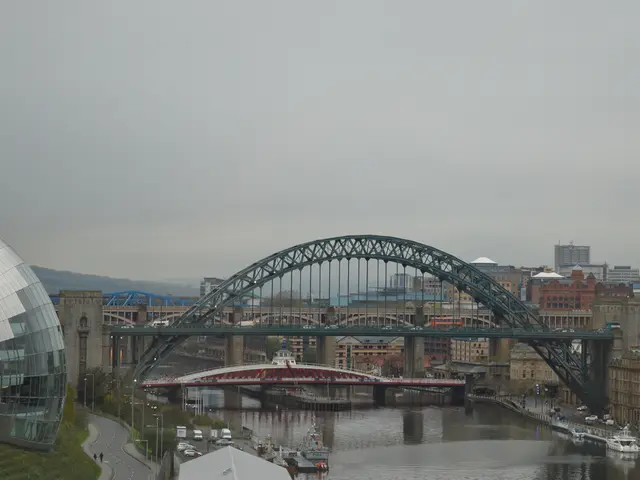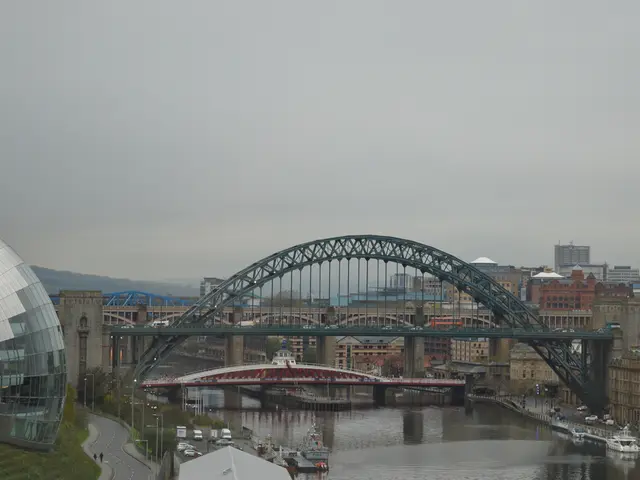Support for stricter environmental regulations and increased carbon taxes on polluters among environmentally-focused citizens in Singapore prior to the 2025 budget announcement
Singapore's carbon tax policy, implemented in 2019, has seen significant progress since its inception. According to the Ministry of Finance's green budgeting occasional paper, approximately 80% of Singapore's greenhouse gas emissions are currently covered by the carbon tax after accounting for allowances given to businesses [1].
The tax applies to facilities producing 25,000 tonnes or more of CO2 equivalent (tCO2e) annually and covers all sectors without exemption. While the policy allows for the use of high-quality international carbon credits to offset up to 5% of taxable emissions, this offsetting acts as a discount rather than a full coverage reduction [1].
This proportion reflects Singapore’s approach to balancing broad carbon tax coverage with some flexibility via offset usage to encourage emission reductions while maintaining industrial competitiveness. The carbon tax rate is set to increase progressively from SGD 25/tCO2e to between SGD 50 and SGD 80/tCO2e by 2030, signaling growing government commitment to carbon pricing [1].
The public consultation exercise in Singapore, which received 580 responses, showed that at least 77% of respondents are in favor of Singapore putting in place policies that provide companies with stronger disincentives to emit carbon [1]. Furthermore, 64% of those who backed more punitive policies on polluters stated that they would pay more for the goods and services of firms that decarbonised at a faster pace [1].
Some respondents urged the government not to allow for the carbon levy's impact to be eroded by allowances and for more transparency in how they are being allocated. Earlier this month, KPMG and Singapore Institute of Directors recommended more transparency over the allocation of carbon tax revenues [2]. Parliamentarians from both the People's Action Party (PAP) and opposition Worker's Party (WP) have also called for disclosures of companies' use of carbon allowances and international carbon credits [3].
Notably, Singaporeans between the age of 20 to 39 responded most enthusiastically to the exercise, with at least 200 of the respondents being above 40 years old [3]. Ajay Kumar Sanganeria, partner and head of tax at KPMG Singapore, suggested that the government should specify which areas the revenue would be given to help businesses plan their investments and innovations [4]. Then-WP member of parliament (MP) Leon Perera proposed an amendment to introduce a publicly accessible online registry indicating who has received such allowances and the ministry's reasons for awarding them [5]. PAP MP Louis Ng stated that "there is no reason these names [of companies who receive allowances] should be a secret." [6]
The amount of allowances awarded to each firm in the industry transition framework will be determined based on their performance on specified energy efficiency or carbon intensity benchmarks [1]. For FY2023, Singapore's carbon tax revenues were S$200.2 million (US$148.7 million) and are expected to increase to S$203.7 million (US$151.3 million) in FY2024 [7].
In summary:
- Carbon tax covers facilities emitting ≥25,000 tCO2e annually.
- Effective coverage after business allowances is about 80% of Singapore’s emissions.
- Up to 5% of emissions can be offset with international carbon credits.
- Tax rate will increase over coming years to strengthen incentives for emission reductions.
This is consistent with Singapore’s goal to decarbonize and promote sustainability while allowing some flexibility for businesses [1][2][3].
[1] Ministry of Finance, Singapore. (n.d.). Green Budget 2022. Retrieved from https://www.mof.gov.sg/content/dam/mof/corp-websites/mof/documents/green-budget-2022/gb2022-english-report.pdf
[2] KPMG. (2022, March 17). KPMG and Singapore Institute of Directors recommend more transparency over the allocation of carbon tax revenues. Retrieved from https://home.kpmg/sg/en/home/media/press-releases/2022/03/kpmg-and-singapore-institute-of-directors-recommend-more-transparency-over-the-allocation-of-carbon-tax-revenues.html
[3] Channel NewsAsia. (2021, October 14). More than 500 respondents in Singapore's carbon tax public consultation. Retrieved from https://www.channelnewsasia.com/singapore/carbon-tax-public-consultation-singapore-response-2969248
[4] Business Times. (2021, October 13). KPMG's Ajay Kumar Sanganeria: Carbon tax revenue should be used to support businesses in their decarbonisation journey. Retrieved from https://www.businesstimes.com.sg/government-economy/kpmgs-ajay-kumar-sanganeria-carbon-tax-revenue-should-be-used-to-support-businesses-in-their-decarbonisation-journey
[5] Channel NewsAsia. (2020, August 27). Calls for more transparency on carbon tax allowances. Retrieved from https://www.channelnewsasia.com/singapore/carbon-tax-allowances-transparency-leon-perera-workers-party-12870778
[6] Channel NewsAsia. (2020, August 27). Calls for more transparency on carbon tax allowances. Retrieved from https://www.channelnewsasia.com/singapore/carbon-tax-allowances-transparency-leon-perera-workers-party-12870778
[7] Ministry of Finance, Singapore. (n.d.). Green Budget 2022. Retrieved from https://www.mof.gov.sg/content/dam/mof/corp-websites/mof/documents/green-budget-2022/gb2022-english-report.pdf
Read also:
- Destroying Bingin Beach in Bali overlooks the substantial danger posed by excessive development
- Gathering at the 2nd Global Meeting on Renewable Energy and Green Chemistry, taking place in 2025.
- Iberian region plunged into darkness due to power surge accident in Spain
- Corporate Biodiversity Reporting Gets a Revamp in 2024: Introduction of GRI 101 Biodiversity








